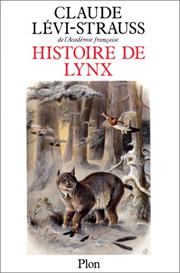| Listing 1 - 3 of 3 |
Sort by
|

ISBN: 2259024270 9782259024273 9782266006941 2266006940 Year: 1991 Publisher: Paris Plon
Abstract | Keywords | Export | Availability | Bookmark
 Loading...
Loading...Choose an application
- Reference Manager
- EndNote
- RefWorks (Direct export to RefWorks)
Biological anthropology. Palaeoanthropology --- Myth --- Mythe --- Indians --- Indiens --- Religion and mythology --- Legends --- Religion et mythologie --- Légendes --- Indians of North America --- Folklore --- Lynx --- Indians of South America --- Tales --- Structural analysis --- -Indians of North America --- -Indians of South America --- -Lynx --- -Tales --- -#GGSB: Religie (alg. - niet chr.) --- Folk tales --- Folktales --- Folk literature --- Canada lynx --- Canadian lynx --- Eurasian lynx --- Felis canadensis --- Felis lynx --- Lynx canadensis --- Lynx lynx --- Lynx (Genus) --- American aborigines --- American Indians --- Indigenous peoples --- First Nations (North America) --- Indians of the United States --- Native Americans --- North American Indians --- Folk beliefs --- Folk-lore --- Traditions --- Ethnology --- Manners and customs --- Material culture --- Mythology --- Oral tradition --- Storytelling --- Culture --- Légendes --- #GGSB: Religie (alg. - niet chr.) --- Folk-lore, Indian --- Structural analysis (Folklore) --- Structuralism (Folklore analysis) --- Structural anthropology --- Methodology --- Psychological aspects --- Indian mythology --- Légendes indiennes d'Amérique --- Lynx (espèce) --- Mythologie indienne d'Amérique --- Histoire et critique. --- Folklore. --- History and criticism. --- Mythologie indienne d'Amérique. --- Indian mythology. --- Structural analysis. --- Religie (alg. - niet chr.) --- 310 --- anthropologie --- ethnologie --- Amérique histoire --- indiens mythologie --- sociologie --- Indians of North America - Folklore --- Folklore - Structural analysis --- Lynx - Folklore --- Indians of South America - Folklore --- Tales - Québec (Province) --- Tales - Northwest, Pacific --- Légendes indiennes d'Amérique --- Lynx (espèce) --- Mythologie indienne d'Amérique --- Mythologie indienne d'Amérique.
Book
ISBN: 9002206593 Year: 1997 Volume: *21 Publisher: Antwerpen Standaard Uitgeverij
Abstract | Keywords | Export | Availability | Bookmark
 Loading...
Loading...Choose an application
- Reference Manager
- EndNote
- RefWorks (Direct export to RefWorks)
Louis Cabera leeft op het eiland Corsica. Hij spijbelt graag, samen met zijn vriend José. Op een van zijn 'vrije' dagen vindt Louis een kattenjong. Hij neemt het stiekem mee naar huis en geeft het te eten. Angstvallig houdt hij het dier voor zijn ouders verborgen, maar de situatie wordt onhoudbaar...
Dutch literature --- Corsica --- Lynxen --- Relatie kind - dier --- Jeugdboeken 10-12 jaar --- Avontuur --- Jeugdliteratuur --- Jeugdliteratuur ; verhalend --- Vriendschap met dieren --- Lynx
Book
ISBN: 9789401472630 Year: 2020 Publisher: Tielt Lannoo
Abstract | Keywords | Export | Availability | Bookmark
 Loading...
Loading...Choose an application
- Reference Manager
- EndNote
- RefWorks (Direct export to RefWorks)
Niemand had het ooit nog voor mogelijk gehouden, en toch is het zo: de wolf is helemaal terug. Zowel in België als in Nederland groeien er wolvenwelpen op. Maar de wolf van de 21ste eeuw lijkt helemaal niet op die uit het sprookje van Roodkapje. Integendeel, de echte wolf wil niets liever dan ongestoord met ons samenleven. Dit boek scheidt fabel van waarheid en vertelt waarom we het iconische roofdier met open armen (en een beetje schrikdraad) mogen ontvangen.Ruim honderdvijftig jaar na zijn bijna-uitroeiing heeft de wolf het laatste deel van zijn voormalige leefgebied heroverd: de Lage Landen. Intussen is de regio goed op weg om een heus wolvenkruispunt te worden.In dit boek dompelt Jan Loos je onder in de fascinerende wereld van de wolven. Wie is de wolf en hoe herken je hem? Hij neemt je mee langs zwerftochten van soms honderden kilometers lang, door velden en bossen, langs zandwegen en over rivieren. Dikwijls loopt het spoor zelfs dwars door dorpscentra en over drukke ringwegen. Hij legt uit hoe wolven leven, zich settelen, daten en een gezin stichten. En hij houdt een vurig pleidooi voor een vreedzame co-existentie tussen mens en roofdier.Bron: flaptekst
Animal ethology and ecology. Sociobiology --- Mammals --- Netherlands --- Belgium --- Wolven --- Didactics of biology --- Vertebrates --- Zoology --- roofdieren --- wolven --- zoogdieren --- Wolf --- België --- Nederland --- Lynx --- Leefgebied --- Dierspoor --- Mens --- 21e eeuw
| Listing 1 - 3 of 3 |
Sort by
|

 Search
Search Feedback
Feedback About UniCat
About UniCat  Help
Help News
News